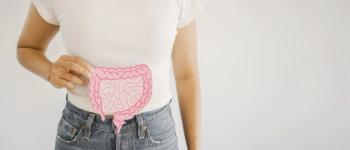
Psyllium Fiber May Reduce Abdominal Pain in Children with IBS
Children with IBS who consumed psyllium for six weeks experienced a greater reduction in mean number of pain episodes than a placebo group, researchers report.
Researchers in Texas have found that psyllium husk, a source of soluble dietary fiber, may be effective at reducing abdominal pain in children with irritable bowel syndrome (IBS). Writing in Clinical Gastroenterology and Hepatology, they report that children with IBS who consumed psyllium fiber for six weeks experienced a greater reduction in mean number of pain episodes than a placebo group.
The randomized, double-blind trial included 85 children aged 7–18 who were given either psyllium or a maltodextrin placebo to consume orally for six weeks. In addition to assessing the subjects’ pain and stool diaries, researchers evaluated methane production, breath hydrogen, intestinal permeability, and the composition of the microbiome before and after the experimental period. Stool patterns, gut barrier function, and gut bacteria composition are often associated with IBS, while breath hydrogen levels have shown a relation to pain in previous research.
Although both the psyllium group and the placebo group experienced a reduction in the number of pain episodes over the study period, the psyllium group experienced twice the decline in pain episodes as the control group (mean reduction of 8.2+/-1.2 in the psyllium group vs. 4.1 +/-1.3 in the placebo group).
However, psyllium fiber appeared to have no effect on the proportion of normal stools, gut barrier function measurements, gut bacteria composition, or breath hydrogen levels, leaving researchers still questioning exactly how psyllium fibers works in helping to reduce IBS-related pain.
“This appears to be a potentially beneficial treatment for some kids with IBS, but more research is needed to understand how it works, to see if there are ways that we can make it more effective, and to identify which kids might be the most responsive to that treatment,” said Robert Shulman, MD, professor of pediatrics at Baylor College of Medicine (Houston, TX) and lead author of the study.
Study details
Before beginning the administration period of the study, subjects followed their habitual diet for a two-week baseline period followed by an eight-day diet excluding carbohydrates commonly thought to cause IBS symptoms. Of the 103 children originally included in the study, only those with a less than 75% improvement in abdominal pain continued to the six-week administration period (n=85). The two-week pain and stool diaries were compared between the habitual-diet baseline period and the final two weeks of treatment.
Additionally, researchers measured psychological characteristics of the children at baseline to investigate if subjects with more or less psychological distress responded differently to the psyllium fiber, but psychological characteristics were not found to have any influence on the subjects’ response.
Read more:
Michael Crane
Associate Editor
Nutritional Outlook Magazine
References:
Shulman RJ et al., “Psyllium fiber reduces abdominal pain in children with irritable bowel syndrome in a randomized, double-blind trial,” Clinical Gastroenterology and Hepatology. Published online April 9, 2016.
Newsletter
From ingredient science to consumer trends, get the intel you need to stay competitive in the nutrition space—subscribe now to Nutritional Outlook.





